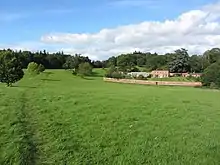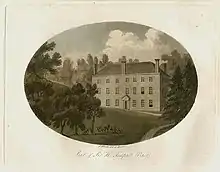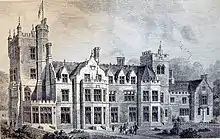Hope End
Hope End is an area and former estate of Herefordshire, England, near the Malvern Hills, noted for its literary associations. As described by a 19th-century railway guide, Hope End Park and a country house lay near the West Midland Railway, between the stations at Colwall and Ledbury.[1] Hope End House may refer to any one of three houses on the estate, all reduced and much altered from their original states. Hope End ward is a local government area that is more extensive than the old estate.

In 1831 an earlier guide, to Ledbury, noted Hope End among "gentlemen's seats and residences", by the Colwall road. It belonged then to E. M. Barrett.[2] This was Edward Moulton-Barrett, father of Elizabeth Barrett Browning who was brought up there; financial problems caused him to sell it the following year.[3][4] The same guide gives fulsome praise to the Park: "Nothing can surpass the romantic beauty of Hope-end park. The most lovely graces of nature are here combined."[5] According to Elizabeth, the setting for her poem The Lost Bower was the wood above Hope End House's garden.[6]
Land at Hope End, around 100 hectares (250 acres), is on the Register of Historic Parks and Gardens of English Heritage.[7]
Owners

- George Pritchard of Hope End, in the 18th century, had sole heiress Susannah Pritchard Lambert, his granddaughter and the daughter of Henry Lambert, who married Sir Henry Tempest, 4th Baronet (1753–1819)in 1791.[8]
- Sir Henry Tempest, 4th Baronet, who acquired the Hope End estate by his marriage.[9] The Beauties of England and Wales wrote (1805) "On the well-wooded eminence called the Dog-hill, north of Ledbury, is Hope End, a small but very pleasant seat, belonging to Sir Harry Vane Tempest, Bart."[10]
- Edward Moulton-Barrett, who bought the house and land in 1809, with 475 acres (192 ha) of land.[11] The existing house was modified, becoming stables. A new house was completed, to a design and with a garden by John Claudius Loudon.[12] In the "Moorish style", with minarets, it was completed by 1812.[13]
- Thomas Heywood purchased the house in 1832. He died in 1866.[14]
- (James) Charles Archibald Hewitt (1837–1910), of the 24th Foot.[15][16]
The house was burnt in 1910, but the stables remained.[17]


Notes
- Official Guide to the Midland Railway. Cassell & Co. 1887. p. 307. Retrieved 6 September 2018.
- Gibbs, J W. (1831). Hints of Ledbury, a brief description, by a native inhabitant [J.W. Gibbs?]. p. 27. Retrieved 6 September 2018.
- "Edward Moulton-Barrett (father), Biographical Sketches, Brownings' Correspondence". Retrieved 5 September 2018.
- Forster, Margaret (1998). Elizabeth Barrett Browning, A Biography. Vintage. p. 66. ISBN 0099768615.
- Gibbs, J W. (1831). Hints of Ledbury, a brief description, by a native inhabitant [J.W. Gibbs?]. pp. 69–70. Retrieved 6 September 2018.
- Browning, Elizabeth Barrett (2014). Elizabeth Barrett Browning: 21st-Century Oxford Authors. OUP Oxford. p. 489. ISBN 9780199602889. Retrieved 6 September 2018.
- "Hope End, Coddington - 1000276, Historic England". Retrieved 6 September 2018.
- Howard, Joseph Jackson (1897). Visitation of England and Wales. Vol. 7. Heritage Books. p. 20. ISBN 9780788406232. Retrieved 6 September 2018.
- Burke, John (1833). A genealogical and heraldic history of the commoners of Great Britain and Ireland. p. 291. Retrieved 6 September 2018.
- Brayley, Edward Wedlake; Britton, John (1805). The Beauties of England and Wales, Or, Delineations, Topographical, Historical, and Descriptive, of Each County: Hampshire ; Isle of Wight ; Herefordshire. T. Maiden. p. 596. Retrieved 6 September 2018.
- Forster, Margaret (1998). Elizabeth Barrett Browning, A Biography. Vintage. p. 10. ISBN 0099768615.
- "parksandgardens.org, Hope End". Retrieved 6 September 2018.
- "Herefordshire Through Time, Gardens, Hope End, Colwall". 2 March 2015. Retrieved 6 September 2018.
- Crosby, Alan G. "Heywood, Thomas". Oxford Dictionary of National Biography (online ed.). Oxford University Press. doi:10.1093/ref:odnb/13191. (Subscription or UK public library membership required.)
- Fox-Davies, Arthur Charles (1929–30). Armorial Families. Vol. 1 (7th ed.). London: Hurst & Blackett. p. 932.
- Walford's County Families of the United Kingdom. 1908. p. 522.
- Pevsner, Nikolaus (1963). Herefordshire. Penguin Books. p. 105. ISBN 9780140710250. Retrieved 6 September 2018.
Further reading
- Browning, Elizabeth Barrett; Berridge, Elizabeth (1974). The Barretts at Hope End: the early diary of Elizabeth Barrett Browning. J. Murray. ISBN 9780719531064.